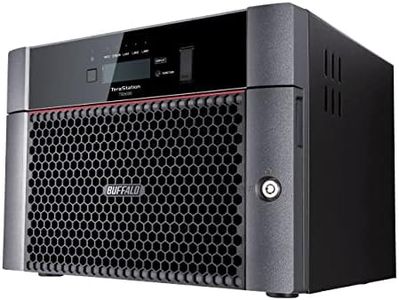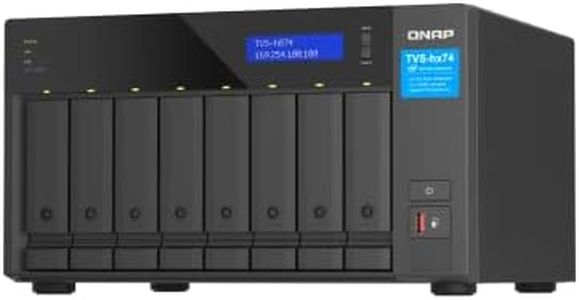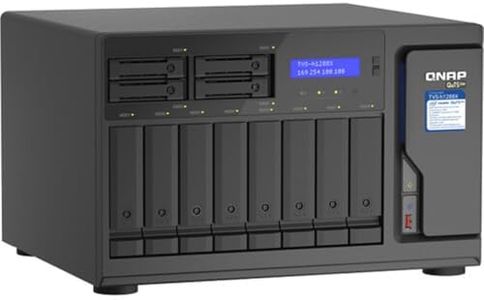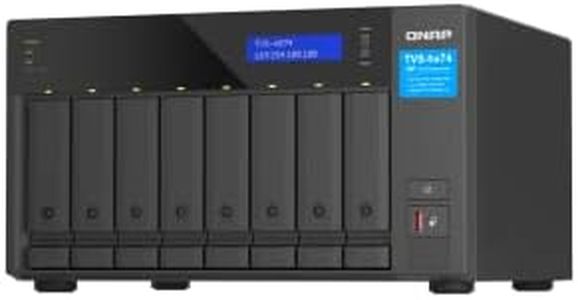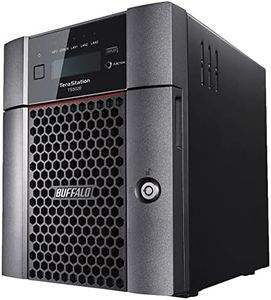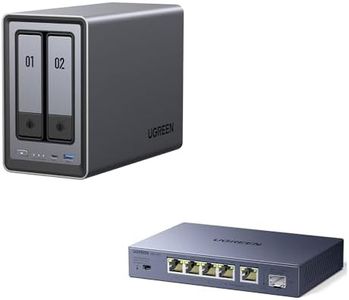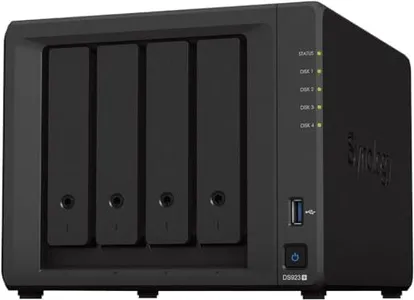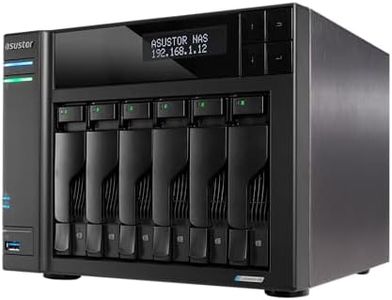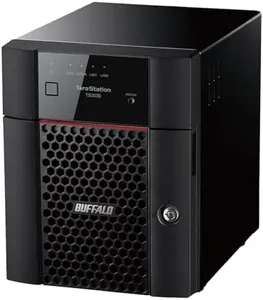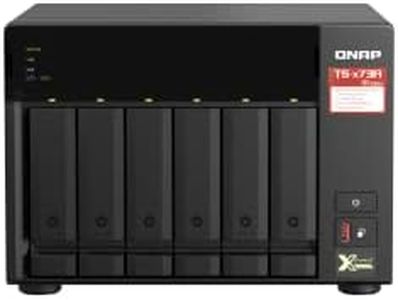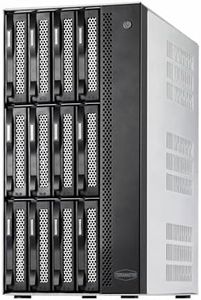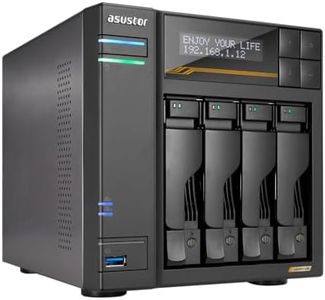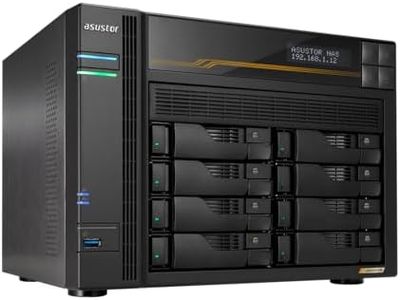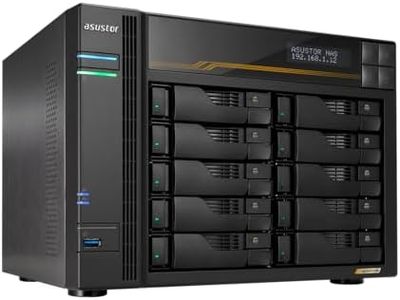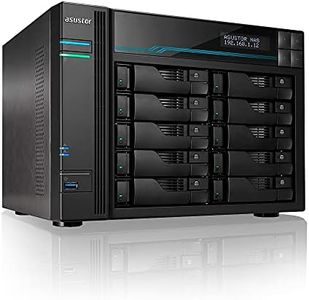10 Best Nas Servers 2026 in the United States
Our technology thoroughly searches through the online shopping world, reviewing hundreds of sites. We then process and analyze this information, updating in real-time to bring you the latest top-rated products. This way, you always get the best and most current options available.

Our Top Picks
Winner
BUFFALO TeraStation 5820DN 8-Bay Business Desktop NAS 160TB (8x20TB) with Hard Drives Included RAID iSCSI Network Storage File Server
Most important from
3 reviews
The BUFFALO TeraStation 5820DN is a solid choice for businesses needing a large and reliable network storage solution. It comes with 8 bays, each preloaded with 20TB NAS-grade hard drives, giving you a massive raw capacity of 160TB. Configured in RAID 6 out of the box, it offers about 120TB of usable space with good data protection, which is ideal for critical business data. The device supports RAID configurations, allowing flexibility depending on your needs for speed or redundancy.
Its hardware is designed for stability and security, featuring a closed system with 256-bit encryption and two-factor authentication to protect sensitive files. The built-in snapshot feature helps with quick backups and recovery, which is useful in preventing data loss from accidental deletion or ransomware attacks. Another standout is the native 10GbE Ethernet port that supports very fast file transfers without needing additional hardware upgrades, beneficial for environments with heavy data traffic.
In terms of compatibility, it works well across Windows, Mac, and Linux systems, making it versatile in mixed-OS offices. Cloud integration with services like Dropbox and Amazon S3 enables hybrid backup strategies for extra data safety. The unit is fairly large and weighs about 31.5 pounds, and while power consumption and noise levels aren’t explicitly detailed, business NAS devices like this typically balance performance with reasonable energy use and quiet operation. The 5600 RPM hard drives are optimized for NAS use but might be slower than higher RPM drives for some intensive tasks. If you need a high-capacity, secure, and business-focused NAS with strong data protection and fast network connectivity, the TeraStation 5820DN is a dependable option best suited for medium to large businesses looking for a robust desktop NAS without having to separately buy drives.
Most important from
3 reviews
QNAP TVS-h874X-i9-64G-US 8 Bay High-Speed Desktop NAS with 12th Gen Intel® Core™ CPU, 64GB DDR4 RAM, 10GbE & 2.5 GbE Networking and PCIe Gen 4 expandability (Diskless)
Most important from
92 reviews
The QNAP TVS-h874X-i9-64G-US is a powerful 8-bay NAS designed for users who need fast, reliable storage with plenty of room for expansion. It comes diskless, allowing you to choose your preferred hard drives, supporting large storage setups. The 12th Gen Intel Core i9 processor combined with 64GB of DDR4 RAM offers strong performance, making it well suited for heavy multitasking, virtualization, and demanding file operations. Dual M.2 NVMe SSD slots help speed up access by enabling SSD caching.
Connectivity is a standout feature here, with dual 10GbE and four 2.5GbE ports, plus multiple USB 3.2 Gen 2 connections, which means transfers and backups can happen very quickly compared to typical NAS devices. This is ideal for users working with large media files or extensive backup tasks. The system supports RAID configurations, which protect your data in case of drive failures and add flexibility depending on your needs. It also includes business-friendly features like cloud backup, virtual machine support, and ransomware protection through snapshots for data safety.
The device features 4K video playback and transcoding with HDMI output, making it a good choice for media professionals or enthusiasts who want to stream content directly. While it's a bit on the heavier side (17 pounds) and likely consumes more power and produces more noise than simpler NAS models, this trade-off comes with the benefit of high performance and expandability. This NAS is well suited for advanced home users, small businesses, or creative professionals who demand speed, capacity, and robust data protection.
Most important from
92 reviews
QNAP TVS-h1288X-W1250-16G High-speed media NAS with Intel® Xeon® W-1250 CPU and Two 10GbE Ports
Most important from
53 reviews
The QNAP TVS-h1288X-W1250-16G is a robust NAS server designed for users needing high-speed media storage and advanced functionality. With an Intel Xeon W-1250 6-core processor and 16GB of ECC RAM, it offers strong performance for handling multiple tasks and users simultaneously, making it suitable for small to medium businesses or tech-savvy home users. The server boasts 12 bays, providing ample storage capacity, which can be expanded further with RAID support for data redundancy and security, a crucial feature for anyone concerned about data loss.
Connectivity is another strong point. With two 10GbE ports and additional 2.5 Gigabit Ethernet ports, transferring large files or streaming high-definition media is quick and efficient. The multiple USB ports, including Type-C and HDMI, enhance its versatility, allowing for easy connections to various devices.
The QNAP TVS-h1288X may not be ideal for everyone. Its size and weight can be cumbersome for home use, especially if space is limited. Additionally, while it excels in performance, the initial setup and management can be complex for users without technical expertise. This may require some time to fully understand and utilize its extensive features effectively. The price point reflects its advanced specifications, which might be considered high for casual users who only need basic storage solutions.
